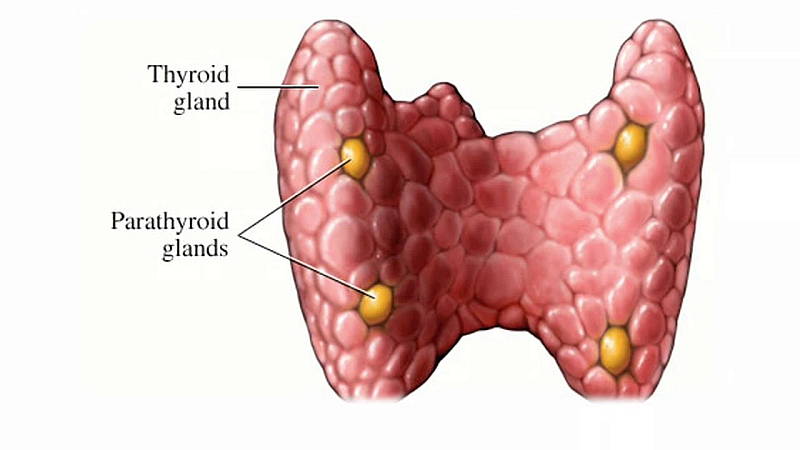Practically everyone knows about the thyroid gland – it’s the gland we blame when we have too much energy, too little energy, trouble losing weight, trouble keeping weight off… but have you heard the term “parathyroid”? Many people haven’t.
What is a parathyroid gland?
Actually, there are four of them. The four parathyroids are located behind the thyroid, in your neck. Under normal conditions, each one is usually about the size of a kernel of rice. They can, however, become a fair bit larger and still operate normally. The parathyroids have a very important job – they are responsible for regulating the calcium that is present in our blood. The importance of this function cannot be over-emphasised, since calcium controls so many bodily functions.
Although they share a similar name, and are close together, the parathyroid glands and the thyroid are not really related.
What does calcium do for us?
Most people know about calcium’s role in skeletal strength – if you read magazines or watch TV, you are constantly seeing ads for calcium supplements to prevent osteoporosis. We know that we need calcium to keep our bones strong, but what a lot of people don’t realize is that our bones are actually a storage and distribution system for the delivery of calcium to the blood. This is what keeps our nervous system functioning properly.
The nervous system is the electrical system of our body, and calcium is the means by which electrical impulses travel. If the calcium level is out of balance, you may feel tired, weak or depressed. Calcium also regulates the energy to the muscular system. If the calcium levels aren’t right, again you may feel weak, and also may experience muscle cramps.
When you think about what calcium does for us, it’s not surprising that it needs its own regulatory system.
Parathyroid glands are constantly measuring the blood calcium level. If the level goes down, the parathyroids make PTH (parathyroid hormone), which visits the bones and extracts some calcium to give to the blood. When the blood calcium level is sufficiently high, PTH production stops. If one of the parathyroids makes too much PTH, this results in a blood calcium level that is too high. The condition is known as hyperparathyroidism.
How is hyperparathyroidism treated?
The only treatment for hyperparathyroidism is surgery, and that if you have a malfunctioning parathyroid and you don’t have it removed, you will probably develop osteoporosis. Also, if you don’t remove a bad parathyroid, your calcium level will remain high for years to come.
The good news is that you don’t really need all four parathyroid glands – in fact, you can get by quite well with just one. Also, when parathyroid glands become diseased, it’s usually only one that is affected, and usually all that happens is that it gets too large and puts out too much PTH. Removing it solves the problem. And further good news is that parathyroid glands only very, very rarely become cancerous.
Surgical techniques have improved greatly over the years, and if you should be diagnosed with hyperparathyroidism, the chances are very good that you can have the offending gland removed and be well on your road to recovery in very little time. Diagnostic techniques have become highly sophisticated, and the surgery itself is very non-invasive. In many instances, you can be operated on and recovering at home all in the same day.
If you have questions about parathyroid problems and hyperparathyroidism, contact your local doctor who will arrange for you to see a thyroid surgeon.
Resources:

